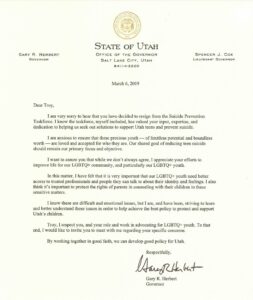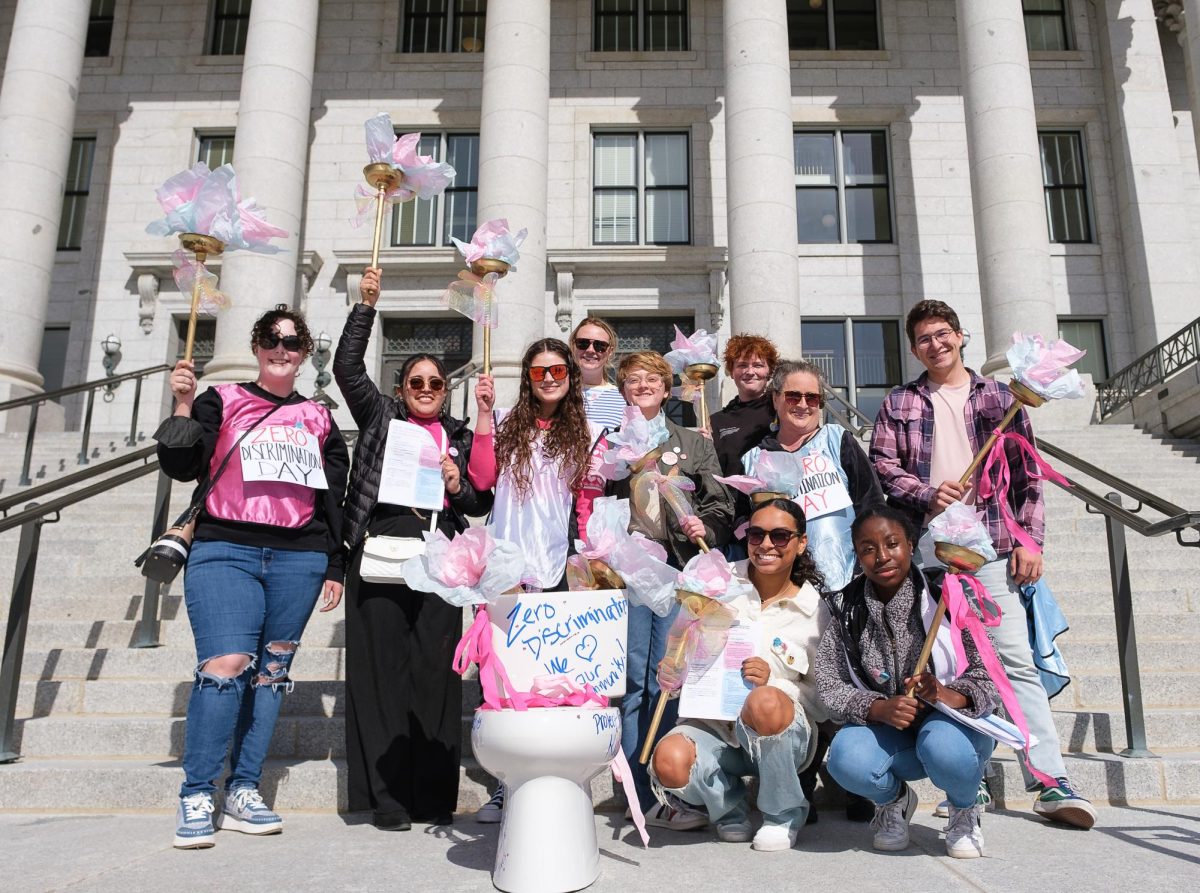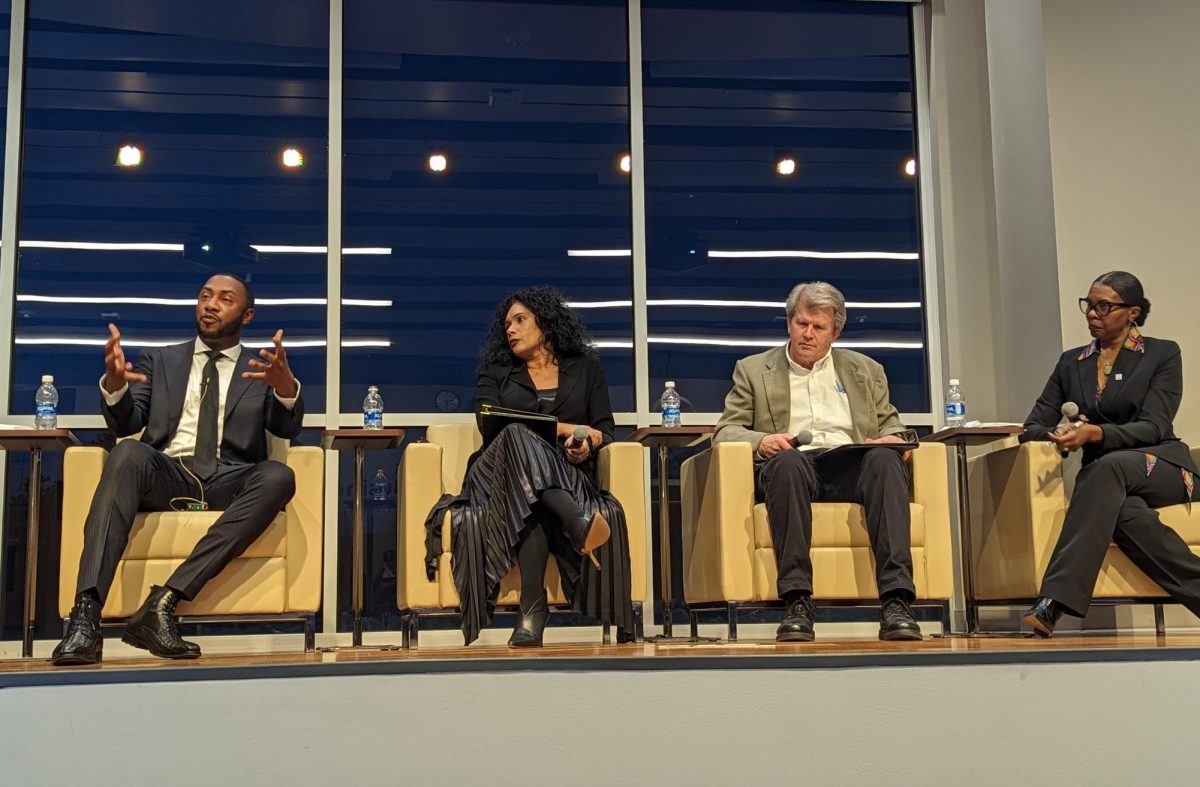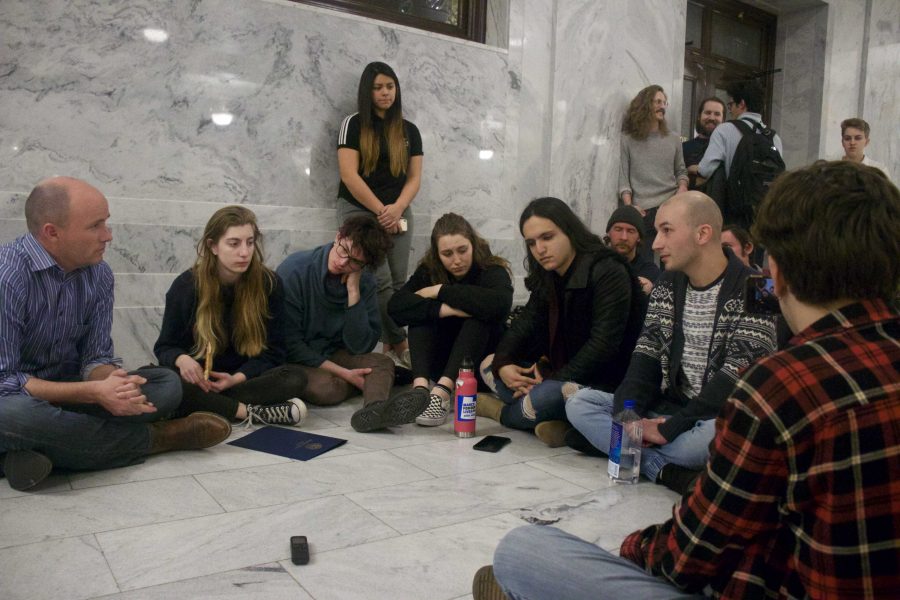A group of LGBTQ youth advocates staged a sit-in at the Utah state capitol on Thursday and were later joined by Lt. Gov. Spencer Cox. The group of about 30 teens who identified as LGBTQ had spent the afternoon outside of Gov. Gary Herbert’s office demanding that he apologize for the death of a bill to ban conversion therapy on minors.
The group has been following, testifying and advocating for HB399, aimed at banning the practice that purports to change a person’s sexual orientation and/or gender identity. Conversion therapy has been banned in 15 states and rejected by leading mental health and medical associations both in the U.S. and the U.K.
The sit-in was the result of a tweet by Amelia Damarjian.
https://twitter.com/PresidentAmelia/status/1103735541541945344?s=19
“I was really upset yesterday and last night about what happened with the bill,” she said, referring to a substitute to the measure, introduced by Rep. Karianne Lisonbee, R-Clearfield, that passed through committee on Tuesday.
The substitute removed verbiage that was directly relational to conversion therapy and focused primarily on banning practices that would “cause pain or physical distress” to minors. The bill’s sponsor, Rep. Craig Hall, R-West Valley City, told Fox 13 on Wednesday that, given the changes, he could no longer let the bill move forward.
Damarjian, who is followed by and follows Cox on Twitter, told The Daily Utah Chronicle that she tagged him in many of her posts expressing anger and sorrow about the bill’s failure on Wednesday. She said that when he responded the next morning he was “callous and still did not really apologize for supporting the so-called compromise.”
The bill’s substitute was seen by supporters as a compromise between the rights of LGBTQ minors and the freedom of therapists, but Damarjian said, had it passed, it would have actually “institutionalized conversion therapy” by only banning physically harmful therapies while allowing talk therapy to continue.
Waiting for an Apology
Damarjian has been hoping for an apology from the governor’s office since he publicly supported the bill’s substitute and said she was particularly upset after reading a letter that the governor’s office had sent out in response to Troy Williams, a prominent LGBTQ advocate and sponsor of the bill, who resigned from the state’s Youth Suicide Task Force.

In his resignation letter, Williams wrote that he had joined the task force in the hopes that the governor’s administration was “serious about addressing issues related to LGBTQ youth suicide,” but continued on to say that the governor’s inaction on LGBTQ issues in the past and finally his support for Lisonbee’s substitute was proof that he was “not interested in the plight of LGBTQ youth.”

In response, a letter from the governor’s office stated that he was “anxious to ensure that these precious youth — of limitless potential and endless bounds — are loved and accepted for who they are.” The letter however continued in support of Lisonbee substitute claiming that it would be a necessary step in protecting “the rights of parent in counseling with their children.”
In one of many tweets addressed to Cox, Damarjian wrote, “When your boss sends out a statement implying that conversion therapy while bad is partly parental choice, please don’t blame the gay rights activist for leaving the table.”
After a long thread of emotional tweets addressed to the lieutenant governor, Cox tweeted back and justified the delay by saying, “You haven’t heard from me because I haven’t given up yet. I spent all day yesterday working on this and will continue to do so for as long as it takes.” Cox went on to write to Damarjian that he is “so sorry” that she is “hurting,” adding that he was also “hurting” because he said he had been working on the bill since November and “thought it had a chance.”
https://twitter.com/PresidentAmelia/status/1103692753777549312?s=19
Damarjian was not satisfied and tweeted back that she would be coming to the capitol and expecting an apology from Gov. Herbert. After the tweet went viral, a number of youth advocates for the bill joined her and spent the afternoon at the capitol.
According to Damarjian, the group was able to meet with various administrative officials at the governor’s office but Cox himself had not been present during those first meetings, instead, he showed up around 6 p.m.
A Letter from the Governor
After sitting down on the floor next to Damarjian, Cox said, “It’s been a rough couple of days for you guys.” His voice began to crack as he said, “I’m sorry.” Cox went on to say that he was proud of Utah for its progress with regards to LGBTQ rights, citing the governor’s appointment of the state’s first openly gay judge and passing an act to protect LGBTQ from discrimination in housing and employment.
Cox, however, said that he “knew that this one [HB 399] would likely be a little bit harder to get done.” The lieutenant governor said that a week ago he thought “it would happen” but he said he was also disappointed that it fell through.
Cox said there had been some misunderstandings about why the bill did not work out and he was happy to talk about it and answer questions. He thanked the teens for coming and said, “By getting involved in the process you actually can make a difference, I know that sometimes it doesn’t feel like it but you can.”
He said, “We’ve been talking a lot, and I know you are tired of words,” to which Damarjian jokingly replied, “So you do read my tweets.” But Cox said he still had a few more words to share, this time from the governor. Cox read out loud a formal apology he said had been personally written by Gov. Herbert.
“I realize there is much that I do not understand about the issues that LGBTQ face every day,” read the letter. It went on to say that LGBTQ youth deserved to be heard and deserved “a future where [they] can feel safe, welcome and loved in our state.” The governor closed the letter with a commitment to “policy that protects our LGBTQ” and an invitation to take part in the process.
Members of the group told Cox they had felt excluded from the process. Among those was Nathan Dalley, a University of Utah student who testified during the bill’s presentation, saying he is a survivor of conversion therapy and had attempted to end his life because of its effects.
Dalley asked Cox, “How are we going to get more LGBTQ people at the table? There are a lot of straight white men up here.” Cox admitted that those involved could have made more of an effort to invite members of the LGBTQ youth and community to the table.
Nathan Winterton told Cox that he is also a survivor of conversion therapy and said, “We need to have more voices than just majority Mormons because my bishop was the one who suggested my torture to me.”
Cox admitted that more conversations should have taken place and included a broader range of LGBTQ community members rather than just having Williams at the table. He committed to having more open sessions in the future.
He said that part of the reason the bill failed to garnish votes was that too much focus had been placed in seeking support from the Church of Jesus Christ of Latter-day Saints and not enough calls had been made directly to lawmakers to assure votes for the measure once it was introduced.
When asked about the governor’s support for the substitute, Cox said that Herbert “never thought that it [the bill’s substitute] would be seen as protecting conversion therapy.”
He said that once his office realized that they were not going to get what they had initially hoped for with the bill, because he said “the votes were not there,” they decided to support the substitute. Cox said they thought they could “get it better next time,” adding that this type of tweaking is something that “happens all the time” in the legislative process.
The group however pushed back on this saying that the bill’s sponsor Rep. Hall knew and was vocal about the fact that the new language would do more harm than good.
“I want to believe that it was a genuine misunderstanding,” Damarjian said, but added that she did not understand how this could be the case when so many advocates for the bill and members of the LGBTQ community were saying “this is really bad.”
Cox responded that he was not expecting her to trust him, he said he knows it will “take a while” for him to “earn that.”
Before leaving, Cox said to the LGBTQ teens, “I want you to know sincerely that I love you. Thank you for helping me be a better person — We’ve got a long ways to go, but we are going there.”
Damarjian said, “It was a nice apology,” but added that she “need[s] to see something concrete.” Although, she said she thinks “it is quite impactful that a bunch of kids eating pizza and Doritos showed up and got the most powerful person in the state to say I’m sorry.”
Note: an earlier version of this article referred to Nathan Dalley as “Nate Dalley.” We regret the error.


















